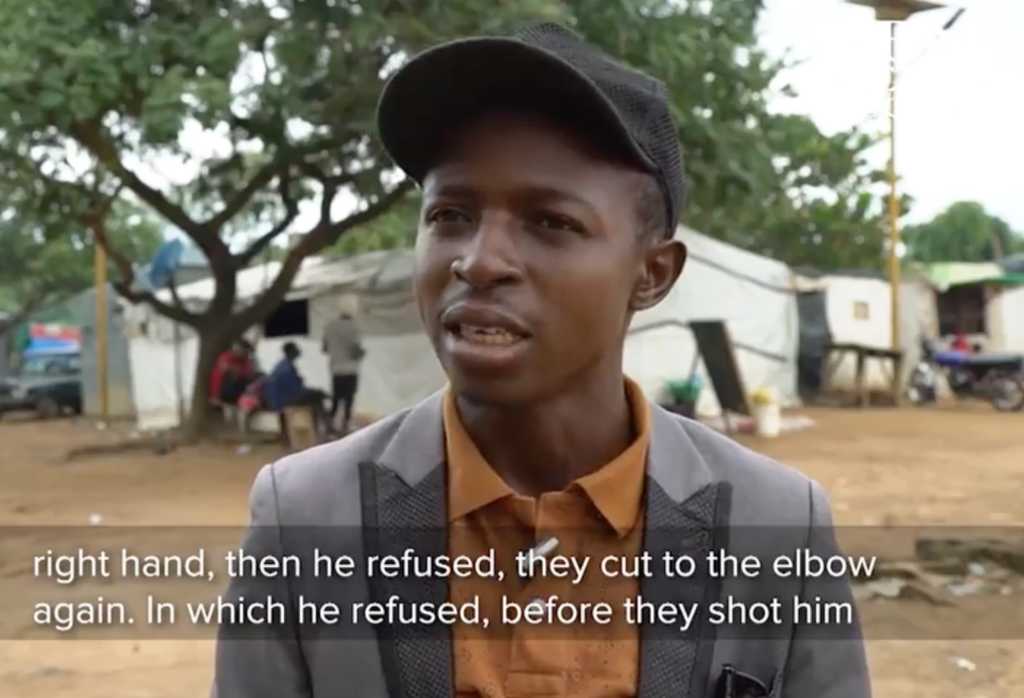By Chuck Holton
ABUJA, NIGERIA – It’s Sunday morning in Nigeria, and Christians across the country are heading to church. As part of the continent’s largest Christian community, believers here have their choice of places to worship. Here at Family Worship Center, led by Pastor Sarah Omakwu, a graduate of Regent University, thousands lift their hands in praise.
But just a few miles away on this Sunday, these people try to find enough food to survive another day.
I visited a refugee camp for people who have been internally displaced from their villages in the north and to the west. There are about 2.5 million internally displaced people within Nigeria, and that makes this one of the largest humanitarian crises in the world right now. And the thing that all of these people have in common is that they are Christians.
29-year-old Aisha Walla grew up in northern Nigeria with her family, scratching out a meager living along with the rest of those in her small village. She is a Christian from one of the largest ethnic groups in West Africa. Life was hard for this young mother of two boys, and it was about to get a whole lot harder.
Boko Haram Invades Village
“In November 2013, Boko Haram invaded our village,” she said. “They killed my father-in-law and abducted some of the children who lived with us. We were so scared, so we fled to the mountains.”
As a movement, Boko Haram has been around for a very long time, starting back in 2002. But as time went on they got more and more radical to the point where five years ago they detonated a car bomb at the UN Embassy in Abuja. And they’ve since then killed thousands of people across the country of Nigeria and elsewhere, to the point where, in 2015, they were designated one of the most dangerous terror groups on the planet.
Much of that terror is directed at Christians. Enoch Yeohanna was one of Aisha’s neighbors.
Burning Churches, Killing Members
“They started with burning churches, killing the pastors, and killing the members. Shutting them down,” he said.
“On 29 September 2014 was the day that they attacked my village. Around ten I had a call that they have killed my dad. They asked him to deny Christ and when he refused they cut off his right hand. Then he refused [again], they cut to the elbow. In which he refused, before they shot him in the forehead, the neck, and chest,” Yeohanna went on.
Many of the 1,500 Christians living in this camp have similar stories. Like Hanatu Katghaya, a volunteer school teacher, who had to flee on foot into Cameroon carrying her three-year-old daughter on her back.
“We escaped from Boko Haram. I walked for two months before I reached Nigeria,” she told us.
Once she arrived, she realized the camp had no school for the children. So she decided to do something about it.
“The thing [that] has tortured my mind is that these children are living like that without going to school. So we sit down and discuss. Are we going to leave them like this? This Boko Haram is because of illiteracy they receive money and go and kill everyone. So if we don’t teach these children, it will affect us directly or indirectly,” Katghaya said.
“Now, I thank God. The children now – we have seen a great change,” she said.
She and other volunteers go beyond reading and arithmetic. They teach the children about their heritage since many of these little ones have never seen their true homes.
“We always cry, there is a song that our children always sing, ‘oh my home, oh my home.’ Because there is no place like home,” said Yeohanna.
Dismal Conditions in Refugee Camp
After a night of rain, I saw that the polyethylene covering the tops of the shacks in the refugee camp gets leaky very quickly. It’s hard to convey just how miserable the living conditions here truly are. And when you’ve got no money to eat, putting a new roof on your house is somewhere pretty far down on the list.
“One of the hardest things about living here is the leaky roofs during the rainy season because the water is constantly leaking onto our beds,” Aisha Walla said. “We depend on people to provide food for us, and when they are unable to do so, we go hungry.”
The Nigerian military has mounted large offensives against Boko Haram in recent months, and even with heavy losses on both sides, there seems to be no end in sight. Despite the hardships, these displaced Christians are firm believers in the power of prayer.
“If there is peace, there is nothing that will stop us from going there,” Enoch Yeohanna said.
“My faith has helped my prayer life and I believe the prayers of the saints around the world have helped us make it through these tough times,” Aisha Walla said. “My hope is that God will bring all those displaced back to their homes so we can worship God together and live in peace.”



